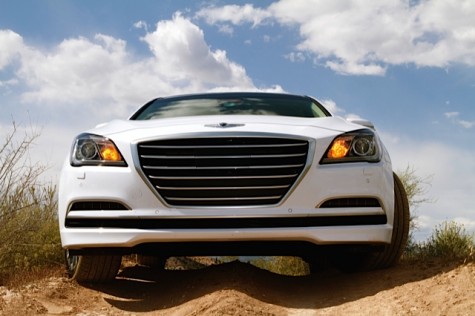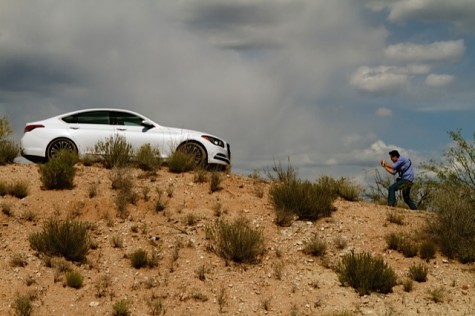This weekend I was invited out to Arizona, along with a group of reporters, to drive the newly redesigned Hyundai Genesis. It’s no secret that I’m a fan of the brand. They’ve been growing and changing and it’s hard to believe that this is the same Hyundai that landed on American shores in 1986.
The 2015 Genesis has been redesigned to allow Hyundai to stake a claim with the luxury market. It’s a beautiful vehicle with a stately grille and sexy lines from headlamp to taillight.

The interior styling is pure luxe. The cabin features matte wood grain, a fantastic touch screen navigation system and an analog clock. I can’t tell you why I enjoy the analog clock as much as I do, but it’s a feature I really enjoy and luxury car makers seem to understand that we all like to just look at a clock every now and again.
The seats are leather at every trim level and both cooled and heated.
The standard features on this vehicle are mindblowing. There are a thousand reasons to consider a Hyundai but these are some of my favorites (in no particular order):
- In addition to having an incredible warranty (10 years/100,000 miles for the powertrain) the new Genesis includes a five year unlimited-mile roadside assistance plan.
- They’ve added a ninth airbag for the driver’s knees
- 18 inch alloy wheels are standard on the 3.8 liter engine and 19 inch on the 5.0
- When you lock the car and walk away the rear view mirrors fold in toward the car keeping them safer from scratches and giving you a visual cue that your car is locked
- The steering wheel is heated. This is an endless source of joy for me.
If you’re considering a luxury midsize car I’d make a recommendation there. The magic for me was in the Tech Package. The Lane Departure Warning and Lane Keep Assist is a new feature for the 2015 Genesis and came standard on the 5.0 RWD but was part of the Tech Package with the smaller engine.
The Lane Departure warning is an option that you need to turn on (press a button on the dashboard) when you begin your journey. If you start to drift to the edge of a lane the steering wheel will vibrate a bit. As you drift into another lane it will actually correct you gently and pull your car back to your lane. This is easy to override and if you’re just changing lanes without signaling the wheel will feel a little tight but it won’t be prohibitive or even make it difficult for you to maneuver the car. It’s just a tactile bit of feedback for you in a world that’s dominated by beeps and flashing lights. Arizona provided the perfect roads to test this out as it’s long flat stretches without any stoplights. It’s easy to drift and I found this to be a fabulous feature.
Smart Cruise Control freaked me out in the best possible way. Here’s how it works. You set the cruise control as you would with any other vehicle. Then you pick the distance you’d like to be from the car in front of you. There are four options and I chose the furthest one from me. As you’re driving if the car in front of you slows down your cruise control slows you down too in order to maintain the distance you’d previously decided upon. Here’s what I’ve never seen before. When the car in front of you speeds up so does the Hyundai Genesis. You go right up to the speed you’ve selected or the distance from the car in front of you, whichever is safer. Here’s a video Vincent from Slashgear took of me driving without my feet on either pedal for a minute and a half.
The Genesis is neither a sports car nor an off road vehicle but we drove it obscenely fast and then took it off road for a photo shoot. In both instances it performed well. I was impressed by the lack of road noise right up until about 95 mph but since the speed limits are typically 65 and only sometimes 75 that shouldn’t be an issue for anyone. Speaking of speed limits the Genesis includes the speed limit in it’s heads up display. This is spectacular and even in my home town I often find myself wondering just what the speed limit is.

Perhaps the most revolutionary part of the Genesis is it’s CO2 detector. Apparently an engineer at Hyundai noticed that he got sleepier while driving in a car with more than two people in it and recognized that this was due in part to a build up of carbon dioxide in the cabin. The Genesis has a CO2 detector and when the carbon dioxide levels are elevated it automatically brings fresh air into the car. This doesn’t exist in any other vehicle.
The 3.8 liter all wheel drive Genesis starts at $40,500. If you think that you need your vehicle to be under $50,000 I recommend that you don’t test drive the 5.0 liter with rear wheel drive. I think I could be very happy in the smaller engine. After all it’s a V6 with 311 horsepower, totally respectable. If you drive the 5.0 V8 with 420 hp first and then think that you want to save some money it will be less dazzling and the truth is that this is a dazzling vehicle so when you’re test driving only check out the 5.0 if it’s got a price tag you can actually swing on your budget, it start at $51,500.
I was so curious to learn your thoughts on this car and it sounds magnificent. Thanks for sharing!
Jessica, well written, very detailed and impressive article on the all new 2015 Genesis. You had me feeling eager to get behind the wheel.
Once again, well done piece!
That’s a beautiful car. Interesting about the co2 monitor – very astute observation by that Hyundai engineer!
I’m counting on you to help me pick my daughter’s first car when time comes (not so far off!). Your car reviews are the best and I don’t even like cars:) LOVE the CO2 detector in this car. Wow.